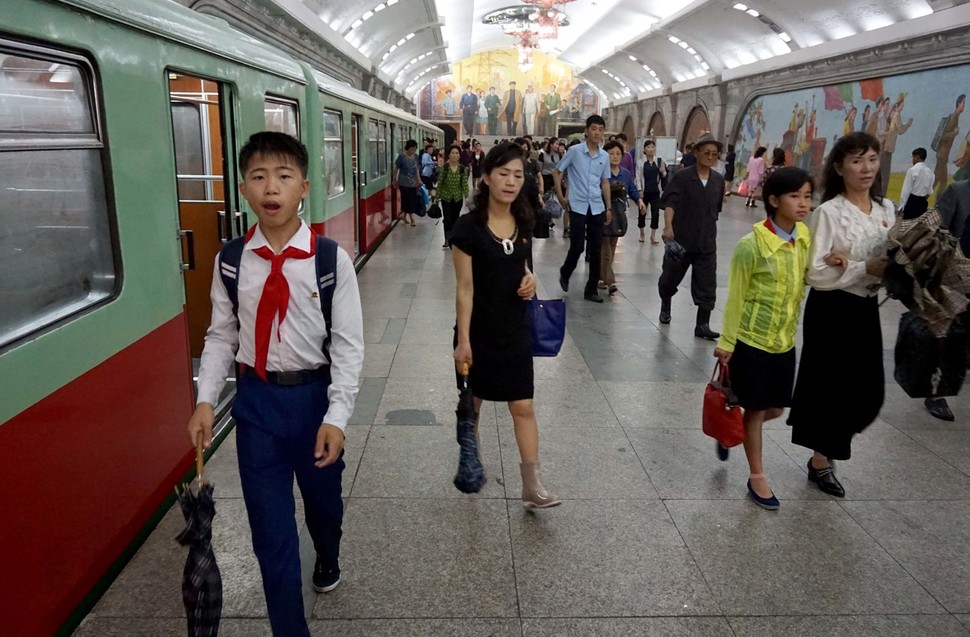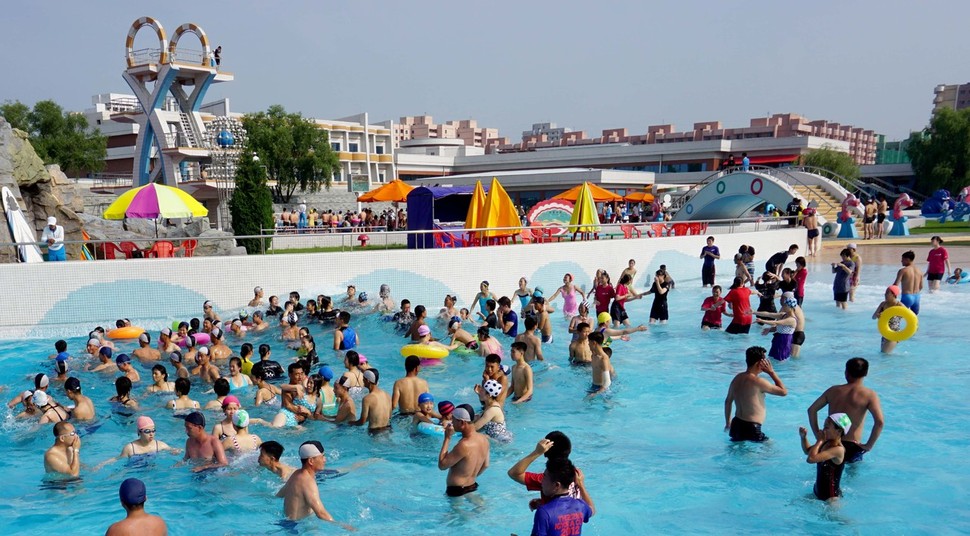 |
|
A North Korean subway station platform photographed by US-based journalist Jin Chyun-kyu. (provided by Takers)
|
Pyongyang bureaus would prevent distorted reporting and eliminate reliance on foreign media
Calls for inter-Korean press exchanges to be adopted as an official agenda item at a third inter-Korean summit in Pyongyang next month are erupting from in and around the South Korean press community. But many are increasingly suggesting that South Korean companies – which have been competing to open “Pyongyang bureaus” as part of inter-Korean exchange efforts – should adjust their expectations in light of practical factors.
In particular, they are suggesting that despite the urgent need for Pyongyang bureaus to prevent verbatim copying of foreign reports and distorted reporting on North Korea, some institutional changes will be needed beforehand.
No “gift baskets” of visiting reporting teams to North Korea
The first news outlet to visit North Korea after the first inter-Korean summit in April was the general programming channel JTBC. Despite some anticipation that its four-day visit on July 9–12 might mark the beginning of press exchange efforts, the network reportedly returned home more or less empty-handed.
“From what I heard, the reporting team met with North Korean officials and agreed on the idea of continuing with exchanges going ahead,” said JTBC administrative bureau chief Kim Sang-woo.
“In our project plan, we included our entire wish list, including the opening of a Pyongyang bureau,” he added.
“It’s a first meeting, so there’s no definite ‘gift basket.’ With all the detailed issues and conditions, we can’t expect anything in the short term.”
Around ten representatives of the public broadcaster KBS also visited North Korea for ten days on Aug. 10–19 to cover an international youth soccer tournament in Pyongyang and discuss press exchange efforts.
"For the first time in ten years, there was a live satellite broadcast in both Seoul and Pyongyang on the main news,” said KBS inter-Korean exchange and cooperation team leader Park Chan-wook, who was part of the visiting reporting team.
 |
|
North Koreans take a break from the heat at a Pyongyang water park. (provided by Takers)
|
“We met with North Korean officials and discussed broadcast exchange efforts including documentaries, reporting programs, and performances. In terms of discussions on a Pyongyang bureau, the differences in views between South and North are such that it looks like we’ll need time for sanctions to be lifted and the conditions to mature,“ he added.
Also visiting were reporting teams from MBC and SBS, who reportedly held their own separate meetings with North Korean officials – albeit at a smaller scale – to discuss broadcasting exchange efforts.
Yonhap News, South Korea’s national mainstay news agency, is also attempting to open a Pyongyang bureau for ongoing press activities and organize reporter exchanges with the Korean Central News Agency (KCNA).
“South Korea’s authorities have been indifferent, but North Korea has also been unenthusiastic, ignoring proposals for press exchange efforts,” lamented Jeong Il-yong, head of the Yonhap News preparation committee for the opening of a Pyongyang bureau.
“The press should be leading the way in terms of making efforts to improve inter-Korean relations and integrate. We can’t say anything for ourselves when there are still cases where we’re getting in the way of that with inaccurate reporting,” he added.
His remarks suggest that while a difference in perspectives on the press’s role is one reason for North Korea not focusing on press exchanges, another major factor is distrust with the South Korean press over issues of erroneous reporting, such as claims that Samjiyon Orchestra director Hyon Song-wol had been executed by firing squad.
While the rapid advances in inter-Korean exchange sparked intense interest among news outlets in setting up bureaus in Pyongyang, the overall mood now is that the situation is going to“take some time,” as it requires the cooperation of South and North Korean authorities beyond the outlets’ own commitment.
Foreign reporters also denied permanent presence
In North Korea, the KCNA and Korean Central Television (KCTV) hold authority on issues concerning the establishment of bureaus and stationing of reporters by foreign news outlets. Both submit applications to the Foreign Ministry to allow permanent stationing following approval from the Workers’ Party of Korea Central Committee Propaganda and Agitation Department (PAD); the final decision is typically made at the highest levels. Among the news agencies that have bureaus in Pyongyang are China’s Xinhua, Russia’s Interfax, the US’s AP, France’s AFP, and Japan’s Kyodo. In the case of Western media, reporters are not stationed locally but operate as foreign correspondents based in Beijing or Tokyo branches who travel to Pyongyang as needed.
Complications of reporting inside North Korea
In his book “Password from the Third Floor,” former North Korean minister to the UK Thae Yong-ho – who defected to South Korea two years ago – said that “those [news agencies] that insist on stationing reporters as a precondition will not be able to establish bureaus.” Instead, he mentioned an approach where journalists freely travel to and from North Korea to report once a bureau has been established.
As an example, he said the approach had been suggested to APTN – an AP-affiliated television news agency based in London – which went on in 2002 to become the first Western news outlet to successfully establish a Pyongyang bureau.
“It isn’t easy for foreign reporters in Pyongyang to investigate or report on things freely due to all the different controls,” said Eom Jae-han, Seoul bureau director for Japan’s Sangyo Times and a onetime head of the Seoul Foreign Correspondents’ Club.
“In South Korea, they’re competing now to apply to open Pyongyang bureau, but there’s also the question of whether they’ll be able to report freely,” Eom suggested.
At the same time, he added that the presence of a South Korean news outlet with a Pyongyang bureau would be “historic in terms of how much conflict between countries stems from misunderstandings and a lack of information.”
US-based journalist Jin Chun-kyu recently published the book “Pyongyang Time Flows with Seoul Time” (Takers) based on his vivid coverage of North Korea’s recent transformations over the course of four visits between Oct. 2017 and early July 2018.
“People in the North very much take issue with the way the South’s news outlets publish distorted reports as they see fit,” he said in an email interview with the Hankyoreh.
“What I want to say is that the best form of inter-Korean press exchange involves truthfulness and trust in one another,” he added.
One of the Hankyoreh’s inaugural group of reporters, Jin traveled to Pyongyang once again on Aug. 15 and will be reporting in North Korea through Aug. 29.
Despite the importance of direct press coverage to reduce misreporting and distorted reporting that could exacerbate antagonisms amid the already severe cultural divide between South and North Korea since their division, some observers are suggesting detailed guidelines are in order to prevent media from being used for political ends.
“Unlike the news outlets from third countries in the West, we’re a stakeholder here, and there’s a lot of potential material for articles in areas including politics, the economy, and culture,” said Keimyung University professor Choi Woo-jung.
“But there’s also the risk of news outlets falling over each other to become tools in the political battle between the ruling and opposition parties by acting like loose cannons or slandering North Korea,” he suggested.
“We need a societal discussion to prevent that from happening. We should set up an inter-Korean press exchange public debate committee for discussions, and the news outlets themselves need to review and closely adhere to rules for reporting on inter-Korean relations,” he advised.
By Moon Hyun-sook, media correspondent
Please direct comments or questions to [english@hani.co.kr]










